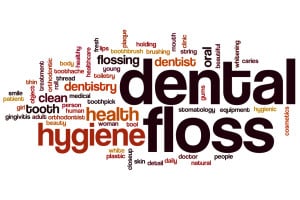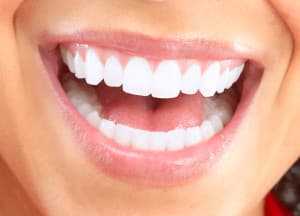 Are you a regular flosser? If so you are in the minority. Just over 40 percent of Americans floss once a day. Flossing is an important part of your dental hygiene. It removes food debris, bacteria, and plaque from between your teeth where your tooth brush can’t reach. Most cavities begin between your teeth, so flossing is an important measure against tooth decay and gingivitis (the early stages of gum disease). Tooth whitening has become a multi-billion dollar business. Couple that with the importance of flossing and it is no wonder that whitening floss has been developed. But, if floss is only used between your teeth, how can it whiten your teeth? Read on to find out if whitening floss is the real thing.
Are you a regular flosser? If so you are in the minority. Just over 40 percent of Americans floss once a day. Flossing is an important part of your dental hygiene. It removes food debris, bacteria, and plaque from between your teeth where your tooth brush can’t reach. Most cavities begin between your teeth, so flossing is an important measure against tooth decay and gingivitis (the early stages of gum disease). Tooth whitening has become a multi-billion dollar business. Couple that with the importance of flossing and it is no wonder that whitening floss has been developed. But, if floss is only used between your teeth, how can it whiten your teeth? Read on to find out if whitening floss is the real thing.
Are You A Smoker?
 Smoking is a habit, a bad habit. It is a bad habit because you know that smoking can make you sick, but you still are not able to quit. But before smoking makes you so sick you can die, it can cause other problems, especially in your mouth. Sucking tobacco through your teeth can cause tooth stains, decay, and periodontitis. Are you a smoker? If so, below are some smoking facts that you should know.
Smoking is a habit, a bad habit. It is a bad habit because you know that smoking can make you sick, but you still are not able to quit. But before smoking makes you so sick you can die, it can cause other problems, especially in your mouth. Sucking tobacco through your teeth can cause tooth stains, decay, and periodontitis. Are you a smoker? If so, below are some smoking facts that you should know.
(more…)
Traders Village
 Grand Prairie lies in the heart of the Dallas/Fort Worth Metroplex and has been rated one of the best cities in Texas by Money magazine. Dozens of family-friendly attractions are within a few minutes of Grand Prairie including the Cowboys Stadium, Six Flags Over Texas, and the Ballpark at Arlington. Grand Prairie also hosts Traders Village America’s largest weekend flea market every weekend, year-round. You can shop while your kids enjoy the rides. There is something for everyone at Traders Village.
Grand Prairie lies in the heart of the Dallas/Fort Worth Metroplex and has been rated one of the best cities in Texas by Money magazine. Dozens of family-friendly attractions are within a few minutes of Grand Prairie including the Cowboys Stadium, Six Flags Over Texas, and the Ballpark at Arlington. Grand Prairie also hosts Traders Village America’s largest weekend flea market every weekend, year-round. You can shop while your kids enjoy the rides. There is something for everyone at Traders Village.
Can You Benefit From Gum Contouring?
 When you think of enhancing your smile you may think tooth whitening, veneers, or other cosmetic procedures. Gum contouring is a cosmetic procedure that can enhance your smile as well. Maybe you’ve never considered your gums part of your smile because in most cases your gingival tissue does not show very much when you smile, and that’s the way it should be. However, if you are unhappy with your smile because your gums are too far below your upper lip when you smile, you may benefit from gum contouring.
When you think of enhancing your smile you may think tooth whitening, veneers, or other cosmetic procedures. Gum contouring is a cosmetic procedure that can enhance your smile as well. Maybe you’ve never considered your gums part of your smile because in most cases your gingival tissue does not show very much when you smile, and that’s the way it should be. However, if you are unhappy with your smile because your gums are too far below your upper lip when you smile, you may benefit from gum contouring.
Practicing Conservative Dentistry
 Throughout your years of visiting the dentist you may have run across a dentist that recommended treatments that seemed to be unnecessary. Those types of dentists give dentistry a bad name, or simply do not prescribe to conservative dentistry. No one should have to undergo procedures, dental or otherwise, that are not extremely necessary. There is no ethical reason to cause a person the pain, inconvenience, or expense. Here at Pecan Tree Dental we pride ourselves on practicing conservative dentistry.
Throughout your years of visiting the dentist you may have run across a dentist that recommended treatments that seemed to be unnecessary. Those types of dentists give dentistry a bad name, or simply do not prescribe to conservative dentistry. No one should have to undergo procedures, dental or otherwise, that are not extremely necessary. There is no ethical reason to cause a person the pain, inconvenience, or expense. Here at Pecan Tree Dental we pride ourselves on practicing conservative dentistry.
(more…)
Mom, Dad, My Tooth Hurts!

As a parent you want your children to be healthy, happy, and pain free. When they are in distress so are you. What do you do when you child complains of a toothache? Is there anything you can do to relieve their pain? It is easy to feel helpless when your child looks to you for a solution and you don’t have one. Don’t let that happen to you. When your child says “Mom, Dad, my tooth hurts!” know what steps to take.
(more…)
Louis Tussaud's Palace of Wax & Ripley's Believe It Or Not!

Grand Prairie is part of the Mid-Cities region in the Dallas-Fort Worth metroplex. It is the 15th most populous city in the state of Texas with over 175, 000 people, and there is plenty to do for every one of them. Regardless of your interest, Grand Prairie is a hopping place. While there are numerous activities to choose from perhaps you would like to check out Louis Tussaud’s Palace of Wax & Ripley’s Believe It Or Not!
(more…)
Do You Need An Ergonomic Toothbrush?

Electric vs. manual, soft-bristle vs. hard-bristle, ergonomic vs. traditional…there are so many choices. Do you wonder what all the fuss is about? What is the difference between all of these toothbrushes? Are ergonomically designed toothbrushes better than other toothbrushes? What is so special about them? Do you need an ergonomic toothbrush? We answer some of these pressing questions below.
(more…)
Does Your Jaw Ache?
 Do you wake up in the morning with a jaw ache? It may ache from your ears down, you may have a headache, or even a pain in the neck…literally. If so, you should have your temporomandibular joint (TMJ) examined. What is your temporomandibular joint? It is the joint that connects your jaw to the temporal bones of your skull. Your temporal bones are located at the front of each ear. As the joint that attaches your lower jaw to your skull, your TMJ is the reason you can move your jaw, open your mouth to eat, talk, chew, yawn, and even move your jaw side to side.
Do you wake up in the morning with a jaw ache? It may ache from your ears down, you may have a headache, or even a pain in the neck…literally. If so, you should have your temporomandibular joint (TMJ) examined. What is your temporomandibular joint? It is the joint that connects your jaw to the temporal bones of your skull. Your temporal bones are located at the front of each ear. As the joint that attaches your lower jaw to your skull, your TMJ is the reason you can move your jaw, open your mouth to eat, talk, chew, yawn, and even move your jaw side to side.
(more…)
Does Your Tooth Need To Be Crowned?
If so, do you know what that means? What is a dental crown? Crowning a tooth is a common dental procedure. Dental crowns are also referred to as caps because your dentist is putting a protective cap over your tooth. There are different materials to choose from when getting a tooth crowned: porcelain, metal, porcelain-fused-to-metal, and zirconia. The material used is usually determined by where the crown is going to be placed. Today we discuss the steps involved when your tooth needs to be crowned.








